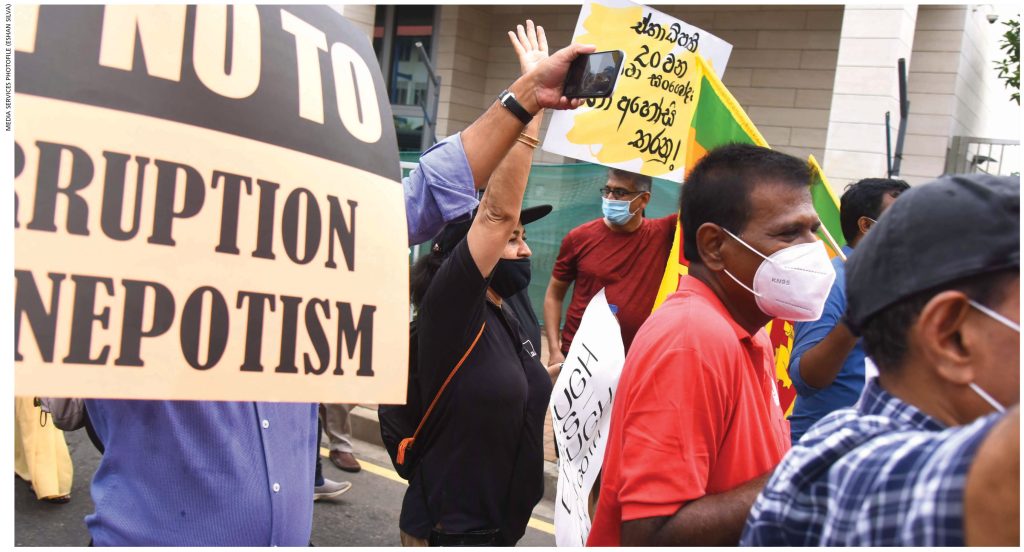STATE OF THE NATION
The National People’s Power (NPP) administration has been at the helm of state for a year or so. In September, the NPP marked the milestone election of an executive president from outside the orbit of traditional political parties.

VIEWPOINTS
STRESS AND STORMS BUT NOT IN A TEACUP!
Wijith DeChickera wonders if great expectations of a polity for ‘system change’ will work up to a big bang or fizzle out to end with a whimper

Next month, the Janatha Vimukthi Peramuna (JVP) led coalition will commemorate the first anniversary of its landslide move into parliament with a super majority set to effect a paradigm shift in politics.
When the JVP ran on the platform of ‘system change’ last year, it was seen as a formal extension of certain sociopolitical aspirations expressed by the unprecedented people’s movement known as the aragalaya, which brought popular sovereignty to the fore in 2022.
And once ensconced in power, it was hoped – by the hoi polloi in the main – that the new government would walk the talk on the political planks over which it stepped into power.
These spanned the spectrum from anticorruption measures majoring on bite not bark, a cleansing of the Augean stables of abuse of national assets and systemic pilfering of state coffers under previous dispensations, and re-establishment of public trust in government.
That it has succeeded in form to some extent while bringing the functioning of the processes into question is perhaps to simplify the issues that confront nation, state and country.
It is incumbent on the governors and their electors to reflect on the fundamentals of the purposes and products of the rectification process.
THE FORM A popular modus operandi of successive regimes was to investigate the suspected criminality of governments it usurped at polls.
In the aftermath of the yahapalanaya government’s electoral victory for instance, the state set up an apparatus to prosecute alleged miscreants under the auspices of the Financial Crimes Investigation Division (FCID).
While this administration has relied more on regular policing and the good offices of the Attorney General’s Department, the result has been unsurprisingly similar. A long line of the usual suspects from opposition ranks has walked through the revolving doors of the Criminal Investigation Department (CID), magistrates courts and Colombo’s permanent high court trial at bar.
THE FUNCTION The shock arrest of the former president in late August took the court of public opinion by storm – especially as to what the motives of the mandarins now ensconced in the corridors of power may be.
And the manner in which the show trial was handled raised no few eyebrows even in quarters unsympathetic to the cause of a controversial former chief executive whose tenure at the helm of state steered Sri Lanka’s ship out of troubled waters for all the thanks a grateful republic could extend.
As with all senior statesmen in Sri Lanka extant today, of course – after decades of often brutal conflict, internecine warfare and insurrectionist rebellions – there are blots over everyone’s escutcheons.
That a plethora of other alleged crimes against the state and its long-suffering citizenry remain unaddressed may leave some concerned commentators puzzled as to what purpose such prosecutions serve.
THE FUNDAMENTAL If the government is to avoid accusations of a political witch-hunt, panoplies of similar indictments must follow suit post-haste.
Unlike other coalitions of dissimilar past political movements, the incumbent administration has ideologically resonant fellow travellers in the hotchpotch of progressives who pass muster to comprise the NPP – so there’s no internal resistance to its imperatives.
To be fair by the regime, a handful of successfully prosecuted political miscreants of the past now languish in gaol, repenting at leisure what they expedited in haste while in power.
However, an unsatisfying number of those indicted managed to have bail posted on their behalf and are enlarged pending further developments redounding to the law’s delays.
There is now a conundrum that the ranks of Tuscany must resolve in the emerging republican milieu’s best interests; and that is whether conservatives, liberals and sundry elements of the old guard safeguarding the welfare of the ancien régime will break ranks with the joint opposition of sorts that coalesced around resistance to the regime’s anticorruption activities.
THE FINAL WORD If the government’s bona fides are not established in terms of its probity where prosecution of past political leaders and their attendant officials is not fair, open to opposition review and public scrutiny through right to information (RTI) mechanisms however, the putative vindictiveness of vengeful political machines may well scupper what was meant to be a reforms process aimed at ensuring that neglected social justice was done.
In that event, voter citizens – as usual and always – will have the last word at the next poll. The point is that perhaps Sri Lanka cannot afford to wait so long to see the aspirations of a long-suffering electorate fulfilled in terms of bringing powerfully placed miscreants who violated public trust in manifold ways to book.
The pity of the matter is that then, even the good intentions of the people’s struggle that was the aragalaya would have failed. And the irony that the NPP stymied its own paradigm shift could echo hollowly.





